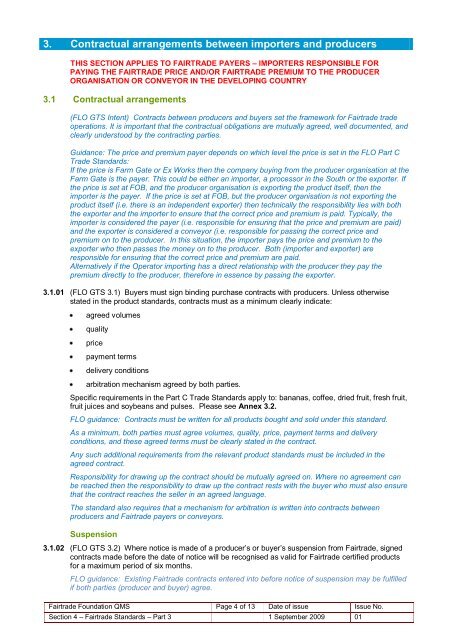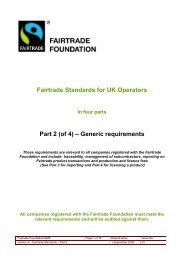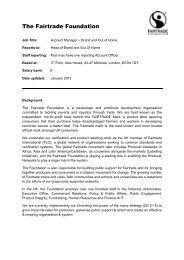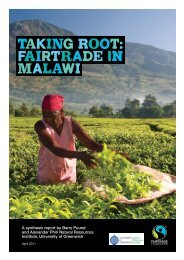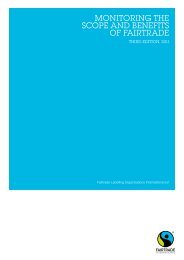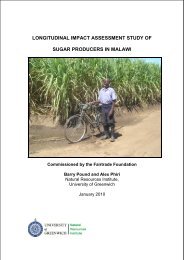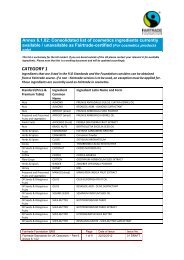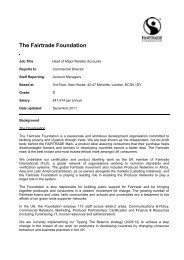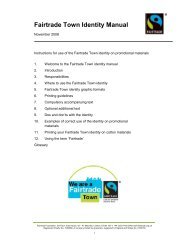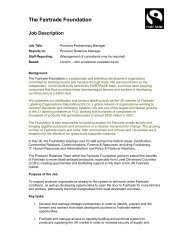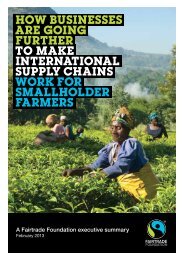Fairtrade Standards for UK Operators In four parts Part 3
Fairtrade Standards for UK Operators In four parts Part 3
Fairtrade Standards for UK Operators In four parts Part 3
Create successful ePaper yourself
Turn your PDF publications into a flip-book with our unique Google optimized e-Paper software.
3. Contractual arrangements between importers and producers<br />
THIS SECTION APPLIES TO FAIRTRADE PAYERS – IMPORTERS RESPONSIBLE FOR<br />
PAYING THE FAIRTRADE PRICE AND/OR FAIRTRADE PREMIUM TO THE PRODUCER<br />
ORGANISATION OR CONVEYOR IN THE DEVELOPING COUNTRY<br />
3.1 Contractual arrangements<br />
(FLO GTS <strong>In</strong>tent) Contracts between producers and buyers set the framework <strong>for</strong> <strong>Fairtrade</strong> trade<br />
operations. It is important that the contractual obligations are mutually agreed, well documented, and<br />
clearly understood by the contracting parties.<br />
Guidance: The price and premium payer depends on which level the price is set in the FLO <strong>Part</strong> C<br />
Trade <strong>Standards</strong>:<br />
If the price is Farm Gate or Ex Works then the company buying from the producer organisation at the<br />
Farm Gate is the payer. This could be either an importer, a processor in the South or the exporter. If<br />
the price is set at FOB, and the producer organisation is exporting the product itself, then the<br />
importer is the payer. If the price is set at FOB, but the producer organisation is not exporting the<br />
product itself (i.e. there is an independent exporter) then technically the responsibility lies with both<br />
the exporter and the importer to ensure that the correct price and premium is paid. Typically, the<br />
importer is considered the payer (i.e. responsible <strong>for</strong> ensuring that the price and premium are paid)<br />
and the exporter is considered a conveyor (i.e. responsible <strong>for</strong> passing the correct price and<br />
premium on to the producer. <strong>In</strong> this situation, the importer pays the price and premium to the<br />
exporter who then passes the money on to the producer. Both (importer and exporter) are<br />
responsible <strong>for</strong> ensuring that the correct price and premium are paid.<br />
Alternatively if the Operator importing has a direct relationship with the producer they pay the<br />
premium directly to the producer, there<strong>for</strong>e in essence by passing the exporter.<br />
3.1.01 (FLO GTS 3.1) Buyers must sign binding purchase contracts with producers. Unless otherwise<br />
stated in the product standards, contracts must as a minimum clearly indicate:<br />
agreed volumes<br />
quality<br />
price<br />
payment terms<br />
delivery conditions<br />
arbitration mechanism agreed by both parties.<br />
Specific requirements in the <strong>Part</strong> C Trade <strong>Standards</strong> apply to: bananas, coffee, dried fruit, fresh fruit,<br />
fruit juices and soybeans and pulses. Please see Annex 3.2.<br />
FLO guidance: Contracts must be written <strong>for</strong> all products bought and sold under this standard.<br />
As a minimum, both parties must agree volumes, quality, price, payment terms and delivery<br />
conditions, and these agreed terms must be clearly stated in the contract.<br />
Any such additional requirements from the relevant product standards must be included in the<br />
agreed contract.<br />
Responsibility <strong>for</strong> drawing up the contract should be mutually agreed on. Where no agreement can<br />
be reached then the responsibility to draw up the contract rests with the buyer who must also ensure<br />
that the contract reaches the seller in an agreed language.<br />
The standard also requires that a mechanism <strong>for</strong> arbitration is written into contracts between<br />
producers and <strong>Fairtrade</strong> payers or conveyors.<br />
Suspension<br />
3.1.02 (FLO GTS 3.2) Where notice is made of a producer’s or buyer’s suspension from <strong>Fairtrade</strong>, signed<br />
contracts made be<strong>for</strong>e the date of notice will be recognised as valid <strong>for</strong> <strong>Fairtrade</strong> certified products<br />
<strong>for</strong> a maximum period of six months.<br />
FLO guidance: Existing <strong>Fairtrade</strong> contracts entered into be<strong>for</strong>e notice of suspension may be fulfilled<br />
if both parties (producer and buyer) agree.<br />
<strong>Fairtrade</strong> Foundation QMS Page 4 of 13 Date of issue Issue No.<br />
Section 4 – <strong>Fairtrade</strong> <strong>Standards</strong> – <strong>Part</strong> 3 1 September 2009 01


